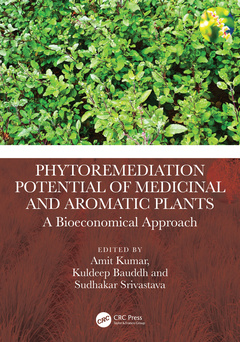Phytoremediation Potential of Medicinal and Aromatic Plants A Bioeconomical Approach
Coordonnateurs : Kumar Amit, Bauddh Kuldeep, Srivastava Sudhakar

Environmental contamination of heavy metals is a major problem, threatening sustainable agricultural production and health of millions of people. The extensive distribution of heavy metals in soil and water makes it necessary to employ environment-friendly low-cost and sustainable approaches for the remediation of contaminated sites. Phytoremediation has been considered a viable approach to meet these demands; however, it must provide some economic gains too. The use of economically important medicinal and aromatic plants is helpful in restoration of metal-contaminated sites and also may provide economic gains to the farmers. The book brings about a critical overview of the prospects of utilizing medicinal and aromatic plants in phytoremediation, including their utility, economic benefits and human safety issues. The book will be a timely addition to the field and would act as landmark. This book is of interest to teachers, researchers, doctoral and graduate students working in the area of environmental pollution and cleanup technologies. The students working in the field of metal(loid) stress and crop biofortification will also find this to be a useful read. The content of the book is presented in simple language and represented through beautiful and scientifically informative figures and tables.
1. Phytoremediation of heavy metals: A Review 2. Biogenic nanoparticles enhance the phytoremediation potential of medicinal and aromatic plants 3. Heavy Metal Accumulation Potential of Medicinal plants: Phytoremediation perspective 4. Role of microbial nanotechnology in medicinal plants growth and phytoremediation 5. Phytoremediation Potential of Ocimum sanctum: A Sustainable Approach for Remediation of Heavy Metals 6. Understanding the potential of Cymbopogon species in remediation of heavy metal contaminated soils 7. An overview on aspects, possibilities, remediation and fortification of contaminants via medicinal and aromatic plants 8. Phytoremediation efficiency improvement: Role of nanoparticles and need for optimizations 9. Role of Aromatic and medicinal plants in phytoremediation of heavy metal pollutants 10. Sustainability of Aromatic Plants In Remediation of Cadmium From Contaminated Sites 11. Assessment of heavy metals and their induced toxicity in medicinal plants: a public health concern 12. Medicinal Plants and Their Role in Mitigation of Arsenic Induced Toxicity 13. Phytoremediation of Arsenic: An Overview
Amit Kumar is currently working as a Research Associate at CSIR-National Botanical Research Institute. He is also worked as a National Post-Doctoral Fellow in Department of Botany, University of Lucknow, Lucknow, India. He received his Ph.D. in Environmental Science (2015) from Babasaheb Bhimrao Ambedkar University, Lucknow, Uttar Pradesh, India. Dr. Kumar is engaged in various aspects of metal/ metalloid phytoremediation, biochemical and molecular approaches with a special emphasis on reducing heavy metal accumulation. He is working on mitigation of arsenic in crop plants and green leafy vegetables with enhancing grain yield through biogenic nanoparticles and elemental based formulation for arsenic affected areas. He has published 36 research papers with total impact factor 146.72, H-index 23 and total citation 2320. He has also published many national and international book chapters and magazine articles. He has presented a paper in international conference at Gdańsk, Poland in 2015. He is life member of several societies as well as non-governmental organizations. He has also served as a reviewer for various national and international journals. He has been conferred several Awards for his contribution, including Protsahan Award-2021; Awsar Award-2020 and Young Scientist Award-2018.
Kuldeep Bauddh is currently an Assistant Professor at the Department of Environmental Sciences, Central University of Jharkhand, Ranchi, India. He received his Ph.D. in Environmental Science from the Babasaheb Bhimrao Ambedkar University, Lucknow, UP, India in 2014. Dr. Bauddh is currently engaged in teaching the thrust areas of environmental sciences like Environmental Pollution and Management, Environmental Chemistry, Environmental Toxicology, Soil Science and Hazardous Waste Management. His main research areas are phytoremediation, restoration of contaminated sites, and slow release fertilizers. He has published three Books (Edited) two wit
Date de parution : 10-2023
17.8x25.4 cm
Thèmes de Phytoremediation Potential of Medicinal and Aromatic Plants :
Mots-clés :
Polyphenols; Medicinal Macrophytes; Macrophytes; Medicinal plants; Contaminants; Phytoremediation



